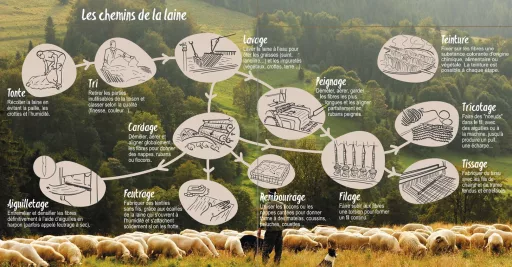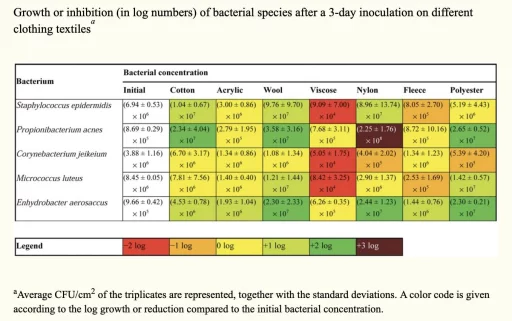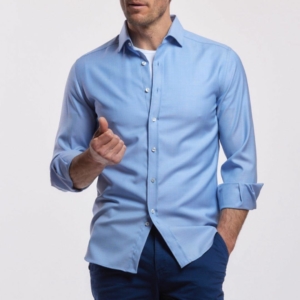Merino wool is a natural material with incredible performance.
Mais elle est trop souvent assimilée à la laine classique et à ses défauts : “ça gratte, ça tient chaud, c’est épais”.
Quite the opposite! It's ideal for summer and for travelling.
Well-known in outdoor sports for accompanying athletes in the mountains, we're now adopting it for the city.
Ideal for our timeless, technical wardrobe, it'll get you to the office, even on your bike.
Here are all the secrets of merino wool...
1) merino wool: what is it?
a) the queen of sheep's wool!
Merino is a breed of sheep with abundant fleece, which produces the rather rare extra fine wool.
A fibre measures between 17 and 19 microns thick, when normal wool is 40 and a hair 65.
It therefore has nothing to do with conventional wool. It doesn't ‘itch’ or keep you warm.
Originating in Spain in the 17th century, the breed was then developed in Europe to compete with English cotton.
Today most of the merino sheep farms are located below the equator,
with Australia accounting for 80% of world production, followed by South Africa and New Zealand.
Raised in the wild, sheep develop a thick fleece that protects them from freezing nights and very hot days.

b) extreme finesse
The more you choose a merino wool finethe better the feeling of softness and warmth, and the performance !
The fineness of the wool also explains the names super 100’s or super 130’s for the fabrics.
A super 100 fabric corresponds to a wool very thin -average diameter 18.75 microns.
A super 130's will be woven with a wool superfine -17,25 microns-.
Nous utilisons des laines merinos super 120 -pour nos shirts and our jumpers- and super 130 for our trousers

c) we have chosen the ZQ merino label
We mainly use superfine wools that have been awarded the ZQ Merino coming from New Zealand.
Because their basic goal seemed obvious to us: a happy sheep produces the best wool.
The sheep are reared free-range, in vast open pastures, generally with more than one acre (0.4 hectares) each.
With so much space available and a hands-off approach, they are free to feed as they wish. Well-fed sheep are better able to cope with extreme weather conditions. In this environment, the animal's health is a priority and the sheep's health is a priority. mulesing is forbidden.
Our partner, the famous Italian house Redaa ZQ-labelled breeder, ensures complete traceability! This merino wool is combed and woven in Italy in the Biella region.
It's no coincidence that Reda is the first Italian textile company to be certified. B corp !

2) from merino wool to fabric: what are the stages?
a) firstly mowing, sorting and washing
The tonset is essential to the sheep's well-being, and is strictly painless!
it is generally carried out once a year, either in Spring or Autumn, or before lambing.
The sorting is done immediately afterwards
to remove the soiled wool or to select the colours.
The washing stage is crucial
it removes all organic, mineral or vegetable residues from the wool
wool can lose up to 50% of its weight during this stage!

b) carding or combing?
these are two different and often complementary stages in the process
carding aerates and stretches the wool, orienting the fibres in the same direction.
This is a ‘rough’ first step, but it can be definitive if you want a wool with a ‘rougher’ feel.
combing involves passing the wool through increasingly fine combs to homogenise the fibres (in length and thickness).
The rest of the process is very well explained here (Belgian wool industry).

c) the result ? yarns and fabrics
the wool will then be spun.
merino wool yarn will be much finer and softer than that of conventional wool.
depending on the piece to be assembled, this yarn can then be
knitted, to make knitwear: pulls, polos
or woven to make fabrics: beautiful thick flannels, very thin shirts or stretchy jerseys.

3) the 4 major advantages of merino wool?
1) It doesn't ‘itch’ or crease very much
Put an end to preconceived ideas!
thanks to its extreme fineness, and unlike conventional wool (> 40 microns), merino wool
does not ‘itch’
does not ‘itch’
does not keep you warm
is very fluid and soft
Its natural elasticity allows it to stretch between 20 and 40%.
This means it will crease much less than cotton, for example.
2) it absorbs moisture perfectly
Merinos wool absorbs up to 30% of its weight, yet feels dry.
That's 120 times more than polyester!!
No wet feeling against the skin, so
3) it maintains a constant optimum temperature
it's called thermo-regulation!
and it's possible thanks to the physical structure of merino wool fibre
The microscopic section -photo below- shows that it has scales, like a hair.
This structure traps air in multiple pockets, slowing its circulation and creating an insulating film.
It keeps you cool in summer and warm in winter.
Polyester and cotton - with their totally thread-like structure - can't compete.
Always at the right temperature, you breathe less. Really ideal in summer!
And because merino wool also dries 3 times faster than cotton, you'll never feel like your shirt is sticking to your skin.

4) It doesn't retain odours!
Last but not least, merino wool has an unrivalled record for not absorbing odours.
it absorbs moisture without allowing malodorous bacteria to proliferate.
no doubt thanks to the lanolin it contains.
It retains 66% less odour than polyester and 28% less than cotton.
A study carried out by the University of Gent in November 2014, shows that it performs better than each of its competitors in terms of non-absorption / evacuation of bacteria (analysis on T-shirts worn after a cycling session and 28 hours' rest).
that's why a merino wool garment smells almost nothing of perspiration..
You can read here and there that you can wear a t-shirt or a merino wool shirt for 1 week without washing it.
It's actually possible! And it saves the planet in terms of the water consumed for washing.

For example, VISCOSE, a wood pulp derivative like Tencel® (but chemically treated in a much less eco-responsible way) was analysed - in the same study by the University of Gent - as being free from malodorous bacteria. So it's a good choice for interior linings.
4) What kind of clothes can you imagine in merino wool?
the revolutionary comfort of merino wool will be ideal for men who feel cramped in their classic city wardrobe, who travel or cycle to the office!








